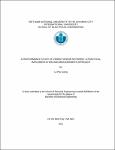| dc.contributor.author | Bao, Nguyen Huynh Phuong | |
| dc.date.accessioned | 2014-12-02T03:48:18Z | |
| dc.date.accessioned | 2018-05-23T02:18:55Z | |
| dc.date.available | 2014-12-02T03:48:18Z | |
| dc.date.available | 2018-05-23T02:18:55Z | |
| dc.date.issued | 2012 | |
| dc.identifier.uri | http://10.8.20.7:8080/xmlui/handle/123456789/1213 | |
| dc.description.abstract | The ZigBee is one of the most potential standardized technologies for wireless sensor networks. Built on top of the IEEE802.15.4 physical and MAC layers of the protocol stack, ZigBee standard was developed to meet the needs for simple, low-power and low-cost wireless communication. In the past couple of years it has become a popular technology for wireless sensor networks. It operates primarily in the 2.4GHz ISM band, which makes the technology easily applicable and worldwide available. However, ZigBee is potentially vulnerable to interference by other wireless technologies working in this band such as IEEE 802.11. Network topology also effect on the performance of the network.
This study aims at analyzing the properties and performance of ZigBee through the practical implementation. By setting up of experimental testbed ZigBee sensor network see thesis work, we carry out the measurement of the received signal strength indicator (RSSI), packet error rate (PER), link quality indicator (LQI), and time delay. We evaluate the impact of wireless technologies IEEE 802.11 on the performance of ZigBee when operating concurrently and in the range. The results of this study will be very useful for implementing ZigBee sensor network for difference application. | en_US |
| dc.description.sponsorship | Ph.D Nguyen Duc Tuan | en_US |
| dc.language.iso | en_US | en_US |
| dc.publisher | International University HCMC, Vietnam | en_US |
| dc.relation.ispartofseries | ;022001818 | |
| dc.subject | Wireless sensor network | en_US |
| dc.title | Wireless sensor network design for wireless traffic sign network | en_US |
| dc.type | Thesis | en_US |


